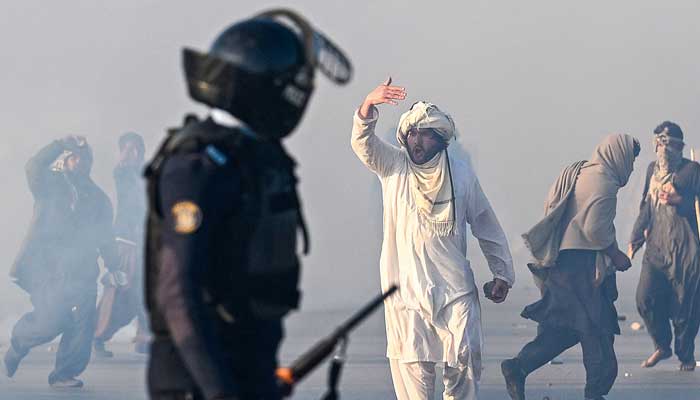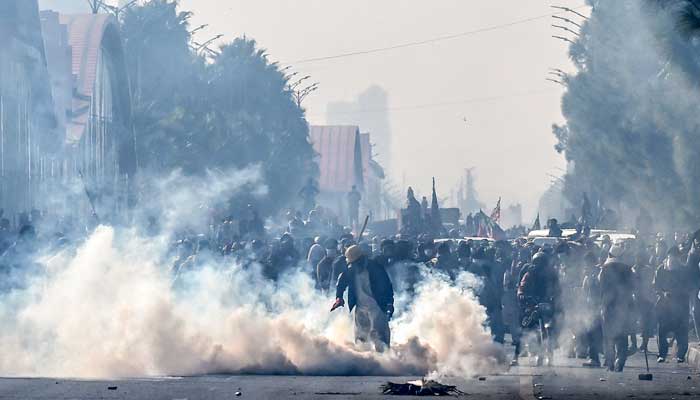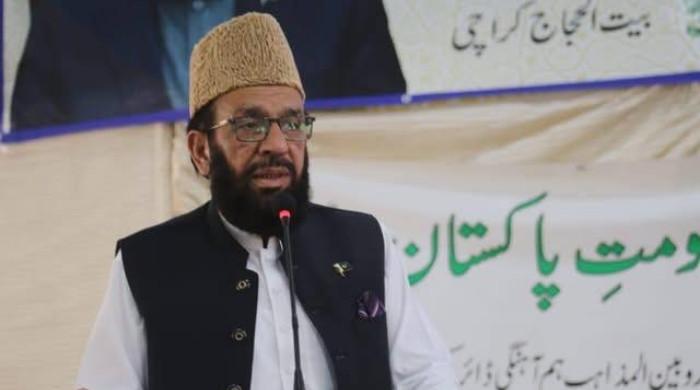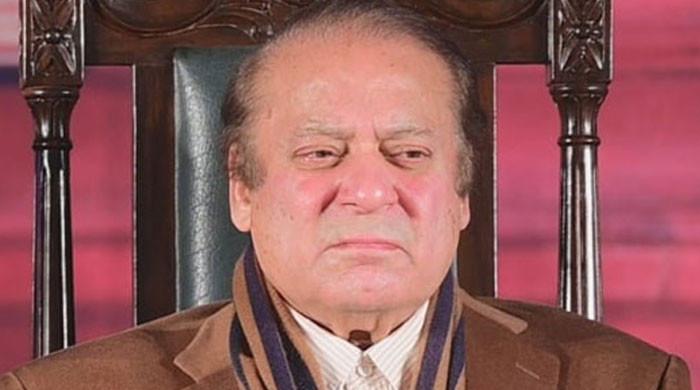Protest dies, conflict survives
Effective democracy, ending terrorism remain two of key ongoing issues faced by state
November 28, 2024

ISLAMABAD: A "do-or-die" protest launched by the Pakistan Tehreek-e-Insaf (PTI) died down abruptly in the federal capital in the early hours of Wednesday, when former prime minister Imran Khan's spouse Bushra Bibi decided to end the protest and return to Khyber Pakhtunkhwa after being overwhelmed by the tear gas fired by the Rangers and security forces.
This action temporarily put down the turmoil but did not resolve the conflict ongoing since 2018. Lack of recognition of the central role of political institutions in decision-making remains a core issue.
On November 24, the PTI initiated a protest march from KP, ostensibly to secure Khan's release from jail. However, the protest neither led to his release nor it could contain the establishment's so-called central role in the country.
These hopes were based on a misinterpretation and miscalculation of the situation, assuming that the establishment's power could be diminished through direct confrontation or an ill-organised protest lacking objectivity. An abrupt decision by Bushra to give up dashed such hopes.
On the night between Tuesday and Wednesday, around 8pm, PTI workers were trying to move a small container towards D-Chowk in the Blue Area when Islamabad Police and Rangers suddenly launched intense shelling on them. The workers abandoned the container and joined Ali Amin Gandapur's convoy, about 100 yards away.
During this time, the container was unguarded for an hour before some unknown individuals set it on fire, which appeared to be a minor incident. Later, this incident played a key role in the decision by the de facto leader of PTI to end the protest.

Bushra was supposed to stay in the same container that would protect her from police and Rangers' shelling, allowing her to lead the protestors comfortably from inside.
Responsible sources report that at around 11:30pm, Islamabad police were instructed to move to the exits of the protest site and be prepared for arrests.
Prior to this, the streetlights in Blue Area, the centre of the protest, had already been turned off and the markets around the protesting point closed. The police quickly reached their designated positions, and at around 11:45pm, the Rangers and security forces launched an operation.
The federal government had already summoned the army under Article 245 of the Constitution on the night of November 24-25. The shelling by Rangers and security forces initially dispersed PTI workers.
Bushra, who was in a safe vehicle, was so panicked by the shelling that she immediately decided to return to KP. A key reason for this might have been the loss of the secure container she was supposed to move into.
When Bushra announced her return from the vehicle, an eyewitness told this reporter that about 30 Pashtuns clung to her car, pleading with her not to leave, vowing to protect her with their lives. However, Bushra did not heed their requests. She had entered Islamabad a night earlier with supporters — said to be numbering 35,000 — from KP.
Over 90% of her convoy was from KP, and she addressed only the Pashtuns in her speeches, encouraging them to make the protest successful to "the last breath because Pashtuns are honourable people."
People in KP were already weary of attacks by the banned Tehreek-e-Taliban Pakistan (TTP) and other terrorist organizations, holding the establishment accountable (rightly or wrongly) for them.
In this context, Bushra's call and Khan’s charismatic appeal were nothing short of a movement for them. Surprisingly, there was no positive response from the people of Punjab or even Rawalpindi to Bushra's call. At the same time, the participation from KP alone is likely to remain an issue for Islamabad in the days to come.

In response to Bushra's calls for protests to release Khan, party leaders were so confident they believed it would be possible within 24 hours of Bushra reaching D-Chowk.
They expected a flood of supporters to accompany her, forcing the government and the establishment to negotiate on her terms, thereby resolving issues like Khan's release, restoring the stolen mandate, and reversing the 26th Constitutional Amendment.
One reason for this confidence was that PTI had organised protests not only in Islamabad but also in the United States. Earlier statements from various US Congress members and the US State Department spokesman Matthew Miller highlighted a sense of hope.
Bushra's participation in the protest was initially kept ambiguous, but when she emerged, she listened to no one, not even Gandapur — the chief minister of KP — who wanted to proceed with the protest methodically and cautiously.
So far, this reporter has confirmed the deaths of about five people, with separate reports confirming the martyrdom of three Rangers, one FC, and one police officer in the protest.
In the last two days of protests about 816 were arrested from different locations.
The immediate end of this crisis does not mean the fundamental conflict facing the state has been resolved. Establishing effective democracy and stability, and completely ending terrorism remain two of the most significant ongoing issues for the state.
The PTI may not head towards Islamabad again in the near future, but, god forbid, in case of any incident, any public movement could leverage these issues and return to Islamabad, including PTI, once it is reinvigorated.
Disclaimer: The viewpoints expressed in this piece are the writer's own and don't necessarily reflect Geo.tv's editorial policy.
Originally published in The News











